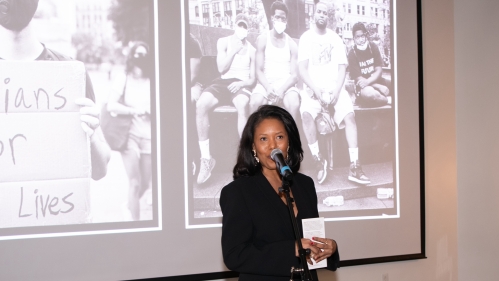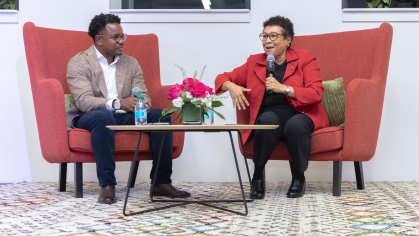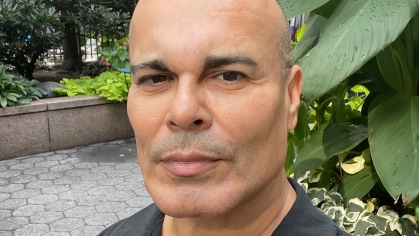Express Newark Resident Poet, Jasmine Mans, Tells the Story of Newark Girlhood

Express Newark’s inaugural Poet-in-Residence Jasmine Mans honed her craft as a daughter of Newark and a member of The Strivers Row Poetry Collective, a renowned group of spoken word artists. Her poetry has garnered millions of views, including videos of Mans performing pieces like Footnotes for Kanye.
A decade later, she’s gone on to win literary acclaim and commercial success for her 2021 poetry collection Black Girl, Call Home, which explores Mans’ queer Black identity, her roots in Newark, and the complicated relationships between mothers and daughters—in addition to offering social commentary and her views on hip-hop culture.
The collection, published by Berkley - Random House, was named one of Oprah’s Most Anticipated LGBTQ Books and a TIME magazine Must-Read. Black Girl Call Home also won recognition from the Stonewall Book Awards and the Black Caucus of the American Library Association for Best Poetry. Essence magazine dubbed Mans the #1 Contemporary Black Poet to Know.
In 2022, she became the voice and writer behind Ulta Beauty’s Muse Campaign, celebrating women of color in the hair industry in ads that affirmed Black beauty and legacy.
“As a Black woman, you’re taught to think there’s something wrong with yourself, and if you’re from the so-called hood, to think there’s something wrong with where you grew up,’’ said Mans, who grew up in the South Ward’s Weequahic section. “But even though I don’t come from a place of financial wealth, I inherited a sense of music, style, and food. My family is thick in love and culture.’’
On June 27 and 28th, Mans will host a two-night poetry performance at Express Newark, where her residency is supported by New Arts Justice, a public arts initiative in Express Newark founded by Pulitzer Prize-winning Rutgers-Newark Professor Salamishah Tillet in 2018 and coordinated by Brooke Finister.
Mans’ tenure as a resident poet – the first at Express Newark – activates poetry on the page, on stage, and in public spaces throughout the city. It began at the start of last semester when the center kicked off its annual theme with an exhibition and events inspired by the 1963 book Blues People, by legendary Newark author and activist LeRoi Jones, who later changed his name to Amiri Baraka. The book follows the evolution of Black music in the U.S. to trace how enslaved Africans became African-American, creating a cultural identity that changed the nation and the world.
“Jasmine Mans embodies the great poetic tradition of Newark,” said Salamishah Tillet, executive director of Express Newark. “Listening to her cadence, witnessing her word play, and catching the depth of her insights is a transformative experience. As a result, it has been riveting to watch her experimenting and expanding her poetry into film and musical performances during her residency at Express Newark.”
Mans is familiar with the late Baraka as an author, neighbor and family friend. She is the niece of the late poet and lawyer Williams Manns, who spent his career as Amiri Baraka’s lawyer. As she rode with him to drop off legal documents at the family home, her uncle educated her on the importance of poetry and the impact of the Baraka family.
One of Baraka’s last pieces of writing, and potentially one of his the most unknown, is his foreword in William Manns’ book, By the Heat, Colder, where he refers to Manns by the name he received during the Black Arts Movement, Yellie Bay.
Mans’ wrote a poem in tribute to Blues People for the exhibition opening and has co-created a series of videos for Express Newark in which she releases new works bi-weekly. The videos appear on the center’s social media channels.
“Amiri Baraka reminds us of three paramount things that are super simple: beauty, truth and accountability,’’ she said. “When I see things happening in the world, I wonder what would he say about this? How would he talk about it as a poet? He would use his poetic license to share news and truth and talk about the oppressed and hold the higher-ups accountable. I’d like to continue to become a poet that is deeply connected to truth more than success and celebrity.’’
Mans performances at Express Newark will expand upon some of the themes of Baraka’s Blues People. As artist-in-residence, she created a work titled Daughter, which explores voice, memory, and reclamation and includes the accompaniment of a live band. There will also be a moderated conversation with Express Newark and New Arts Director Salamishah Tillet.
“It’s a big deal to be the only poet in this space and studying and writing to build out a show and a portfolio of poetry that represents not only Blues People’but the people of Newark,’’ said Mans, who is known for her formidable stage presence and expressive voice, which can shift dramatically from anger and irony to tenderness and compassion in a single verse.
The influence of hip-hop is evident in her live performances, where Mans earned a reputation for firing off devastating, punchline-filled critiques of toxic masculinity, pop culture, racist violence and injustice.
In her role as activist, she was invited to be a contributor to The New York Times Bestseller The 1619 Project, edited by Nikole Hannah Jones, a book chronicling the history of enslaved people and their contributions to the framework of America.
But many of Mans’ pieces are informed by her experiences growing up in Newark’s South Ward, where her great grandparents migrated from Wheeler County, Georgia in the 1920s.
“At a really young age, I became intrigued with rhyme, which started with me listening to Tupac Shakur. I would seek out music that had a really big story. I’ve always been in love with storytelling and rhyme. I think it’s deeply connected to Blackness and the history of Black folk’s language,’’ said Mans.
Mans received a five-year scholarship from University of Wisconsin- Madison’s First Wave Program, where she studied African American Literature and poetry. As she developed her skills, Mans became increasingly drawn to exploring her own story and reflecting the voices of family members.
“There’s something very special and intimate about the language of your grandmother, who didn’t go to college, or the language of your grandmother who came from a different country,” said Mans. “What I try to do is give a spotlight to that voice and ask myself, what did my mother sound like?”
Black Girl, Call Home includes many poems about Mans’ mother. Some are written from the perspective of an adult daughter looking back at her younger self, exploring scenes of adolescent conflict and the many ways in which she didn't and didn’t know her mom.
In Speak to Me of My Mother, Who Was She Mans conveys the desire to know her mom before she gave birth: “Tell me about the girl/my mother was,/before she traded in all her girl/to be my mother…Before I took up so much/space in her prayers,/who did she pray for?”
Initially, Mans was fearful of publishing a collection that was so intimate but her anxieties subsided when the book was embraced by readers. “You feel like your diary has been put on sale at Barnes and Noble,’’ she said. “But the response was that I was speaking for a lot of women of color.’’
She is especially proud of the book’s cover, an image, shot from behind, of a Black girl with a plethora of colorful plastic barrettes in her hair, shaped like bows, carousel horses, bees and butterflies. Mans pushed for the photo, by Micaiah Carter, to underscore that the book is dedicated to her intended audience and to evoke a shared sense of nostalgia.
“I said we can’t be racially ambiguous here. Making this book overtly for Black girls is what made it successful and good. My intention was to speak directly and put this in the hands of Black women without fear or reservation,’’ Mans explained.
Her next collection of poems is slated for 2026. In the meantime, Mans will also be editing a coffee table book, slated by Penguin Random House for 2026 and called Buy Weed From Women. The book, written by women, and edited by Mans, celebrates women who have worked within, and been impacted by, the multi-billion dollar cannabis industry, from farmers and retail entrepreneurs to those who have stood at the intersection of profit and criminality.
“I want to tell the story of women in cannabis because I’ve been studying them. The story of cannabis is a story of criminalization, racial division, racialized marketing, white corruption. It’s a story of great poverty and Black farming and Black land and rights being stolen,’’ said Mans.
Although the book might seem like a departure for Mans, it's another way to cover the same ground she explores through poetry.
“It gives me the opportunity to write and tell the truth about my people: Black and brown people and women,’’ she said.


